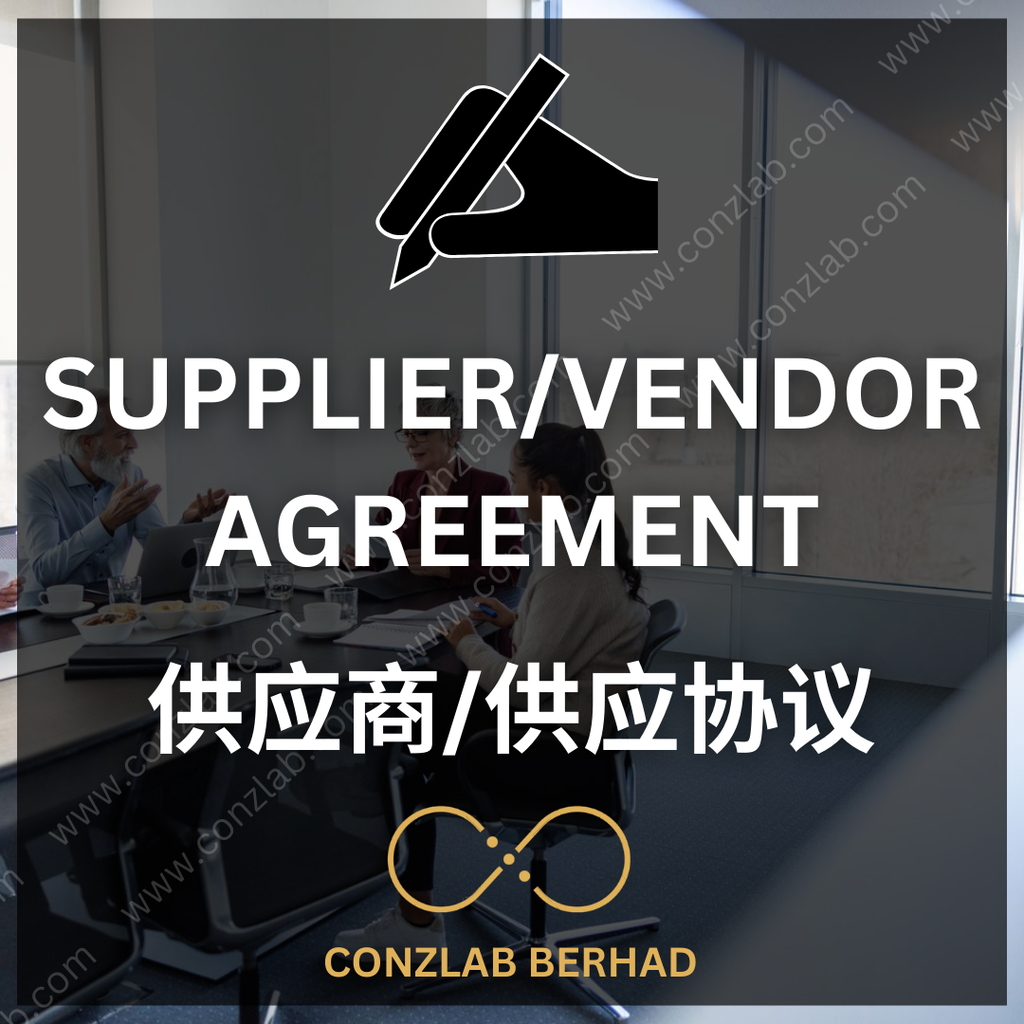Description
- A Supplier/Vendor Agreement is a legally binding contract between a company and its supplier or vendor that outlines the terms and conditions for the supply of goods or services. It ensures clarity on pricing, delivery schedules, quality standards, and responsibilities, protecting the interests of both parties.
GOV Department
- (Dependent on the industry, e.g., Ministry of Domestic Trade and Consumer Affairs (KPDN) or Suruhanjaya Syarikat Malaysia (SSM) for compliance.)
License Name (Malay)
- Perjanjian Pembekal
Details
- Specifies the type of goods or services to be supplied, delivery timelines, and quality standards.
- Includes payment terms, such as pricing, invoicing, and penalties for late payment.
- Covers responsibilities for handling defective goods or service failures.
- Includes confidentiality, termination clauses, and dispute resolution mechanisms.
- Ensures compliance with industry-specific regulations and the Contracts Act 1950.
Important Rules
- The agreement must be signed by both parties to be enforceable.
- All terms related to delivery, payment, and quality must be explicitly defined.
- Any changes to the agreement must be mutually agreed upon and documented.
- Suppliers/vendors must adhere to the agreed quality standards and delivery timelines.
- The agreement must comply with applicable Malaysian laws, including trade and consumer protection regulations.
Compound & Punishment
- Failure to comply with the terms of the agreement may result in:
- Financial penalties or compensation claims for damages caused.
- Termination of the agreement and loss of business relationships.
- Breach of confidentiality or misrepresentation can lead to:
- Legal action under the Contracts Act 1950.
- Fines or imprisonment for severe breaches of trade regulations.
Advisor

Penny Lim , Legal Consulting
Ms. Penny is responsible for identifying possible legal issues and implementing solutions in the areas of government regulation, customer protection, and fair employment. Legal Counsel. Ms. Penny can advise on legal issues such as government and business permits, review legal documents before signing them, and complete legal research as needed by the company
Commonly Asked Questions
A Supplier/Vendor Agreement is a legally binding contract that defines the terms and conditions between a business and its supplier or vendor for the supply of goods or services. It ensures clarity on pricing, delivery, quality standards, and payment terms.
It helps prevent misunderstandings and disputes by setting clear expectations between both parties. The agreement protects business interests, ensures quality compliance, and maintains accountability in supply and delivery arrangements.
Depending on the industry, these agreements may fall under the supervision of government bodies such as:
- Ministry of Domestic Trade and Consumer Affairs (KPDN) for trade and consumer protection.
- Suruhanjaya Syarikat Malaysia (SSM) for business registration and compliance.
A well-drafted agreement should specify:
- Type and quantity of goods or services.
- Delivery schedules and quality standards.
- Payment terms, including penalties for late payments.
- Confidentiality and dispute resolution clauses.
- Termination conditions and legal compliance.
Yes. Once both parties sign the document, it becomes legally enforceable under the Contracts Act 1950. Both parties must adhere to all agreed terms, including quality, payment, and confidentiality obligations.
If a supplier or vendor fails to meet their obligations, the affected party may:
- Terminate the contract.
- Claim financial compensation for damages.
-
Take legal action for breach of contract.
Serious violations may also lead to fines or penalties under Malaysian trade laws.
Yes, but any amendment must be made with mutual consent and properly documented in writing. Both parties must sign the updated terms to ensure continued enforceability.
The validity period depends on the contract terms — it can be project-based, yearly, or indefinite until terminated. Renewal terms should be clearly stated in the agreement to avoid disputes.
Non-compliance, such as supplying substandard goods or late delivery, can lead to contract termination, compensation claims, or legal penalties. False representation or fraud may result in prosecution under Malaysian law.
Depending on the business nature, agreements may require compliance with:
- Ministry of Domestic Trade and Consumer Affairs (KPDN) for trade and consumer matters.
-
Suruhanjaya Syarikat Malaysia (SSM) for business registration and governance.
